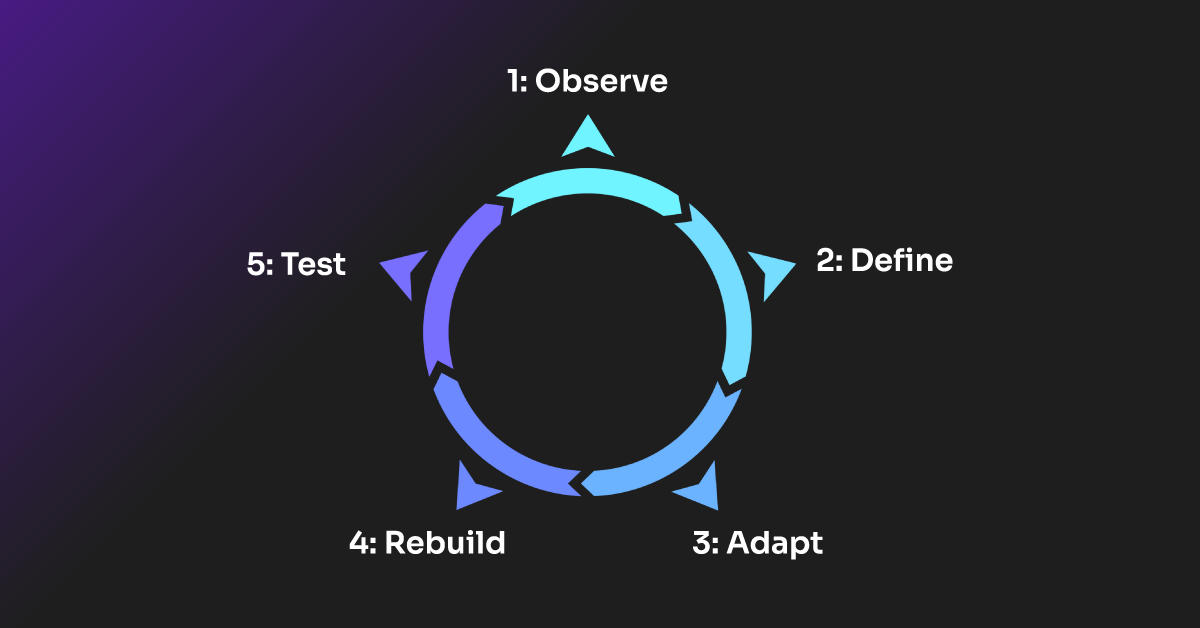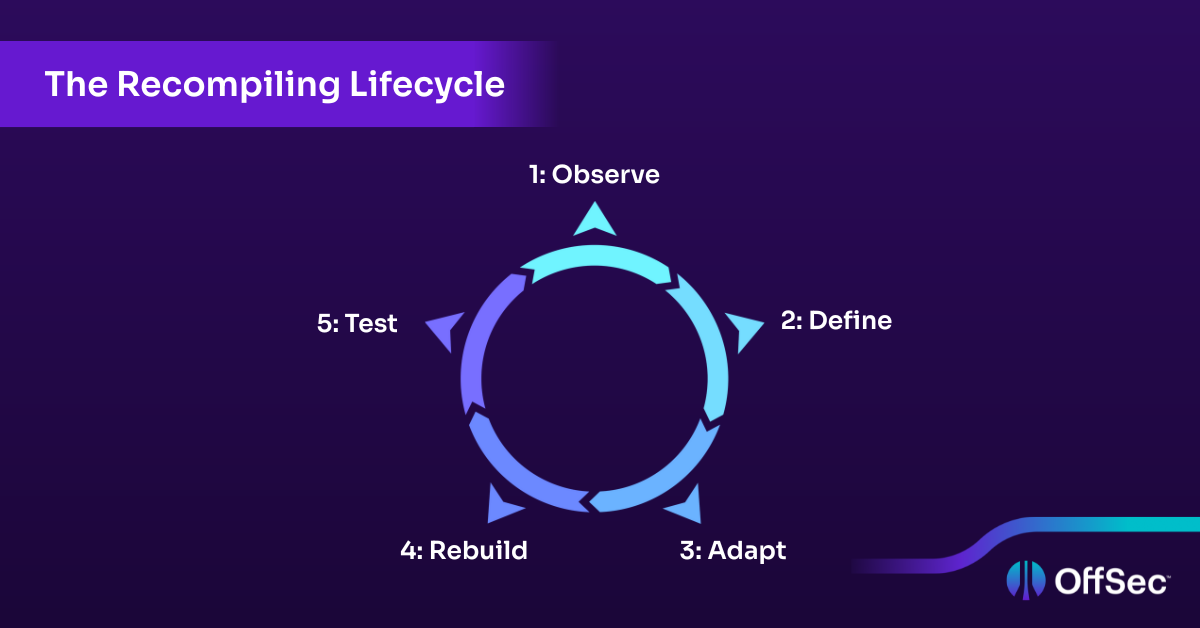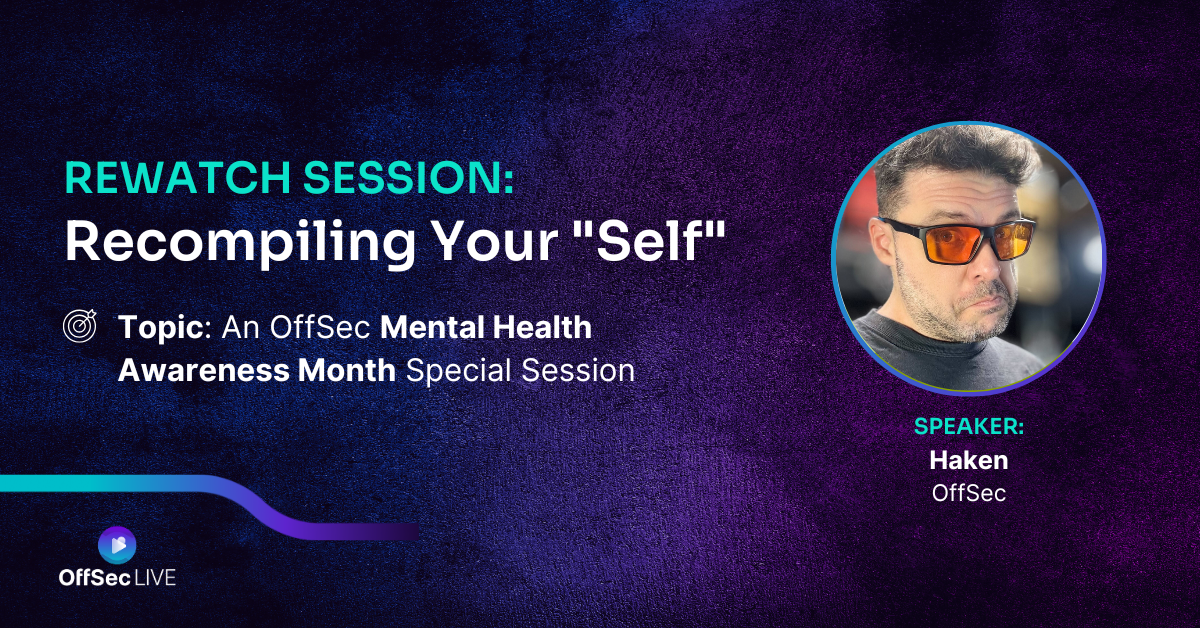
May 28, 2025
Recompiling Your “Self”: A Cybersecurity-Inspired Guide to Resilience
A recap of our mental health OffSec LIVE session, with tips on ensuring intentional change, self-awareness, and digital resilience in cybersecurity.
In an era where systems evolve and software is continually updated for efficiency and security, what if we applied the same approach to our lives? That’s the thought-provoking premise of OffSec’s Mental Health Awareness Month special session, Recompiling Your “Self”, hosted by our very own, Haken.
More than just a tech metaphor, it was a deeply personal and empowering roadmap to intentional change, self-awareness, and digital resilience, especially critical in high-stakes fields like cybersecurity, where burnout and stress are increasingly common.
In this guide, we’ll give you a breakdown of the key insights, actionable strategies, and the five phases of personal recompilation covered in the OffSec Live session,
Just like outdated code, our habits, beliefs, and routines may no longer serve us. The idea is simple: become the architect of your own internal operating system.
This isn’t about perfection or radical overnight change. It’s about consistent, mindful evolution driven by curiosity, not judgment.
“Hope is not a strategy,” Haken reminds us. “It’s a journey of self-discovery, strategic action, and continuous improvement, all aimed at building a good foundation of better resilience.”
This journey is about deliberate self-reinvention: refining our systems (habits), patching vulnerabilities (emotional triggers), and strengthening both our mental and digital defenses. And in a world where mental health in cybersecurity is often overlooked, this framework couldn’t be more timely.

This is our observer phase, a critical diagnostic step where we become curious and non-judgmental observers of our own lives.
- Become a curious observer: You first need to understand the existing system, so think of your life as a complex program. What is its function? What are its strengths? What are its bugs or inefficiencies? But, this isn’t about self-criticism. It’s about self-awareness, and the first step towards building resilience.
- Self-journaling: Dedicate time, even just 10 minutes a day, to write down your thoughts, feelings, reactions, and patterns. What triggers stress? When do you feel most energized? What habits are serving you, and which are draining you? This self-awareness is essential for building the resilience necessary to face and overcome challenges. Thinking and writing are very similar, so writing down your thoughts (on paper) can have a powerful effect.
- Observe your footprint: In this phase, it’s vital to observe your digital habits. How much time do you spend online? What content are you consuming? Are there digital interactions that drain your energy or expose you to unnecessary risks? Just as a pentester would do to find vulnerabilities in systems, we can conduct a personal pentest by critically examining our digital hygiene.
- Identify your defaults: We often operate on autopilot, so observe your default reactions and your go-to habits when you’re tired, stressed, or bored. Do you doomscroll? Do you procrastinate? Do you avoid difficult conversations? These ‘defaults’ are the old code that might need updating, especially if you’re feeling the early signs of cybersecurity burnout.
The define phase is about setting your new specifications. Once you’ve observed, the next step is to define what you want your new, recompiled self to look like. This is about setting clear, actionable specifications for your personal upgrade with resilience as a core objective.
- Clarity is power: Vague goals lead to vague results, so turn your goals into concrete actions. Instead of “be healthier,” define it as “I will exercise for 30 minutes, four times a week, and eat five servings of vegetables daily.” Or, instead of “cut back time online,” define it as “I will limit social media to 30 minutes per day.”
- One task at a time: Trying to change everything at once is like trying to rewrite an entire software program in a single sitting. It’s overwhelming, and prone to errors. Focus on one task at a time, pick one significant habit or behavior you want to change, and dedicate your energy to that. Master it, then move to the next. This focused approach builds momentum and resilience. For someone learning or practicing cybersecurity, this could mean defining specific areas of focus for their pentesting skills, and mastering one tool or technique before moving to the next.
- Parkinson’s Law: Work expands to fill the time available for its completion. When defining tasks, set strict, realistic deadlines to increase efficiency and prevent overload, a common precursor to burnout in cybersecurity. If you allocate an hour, it will take an hour. If you allocate 15 minutes, you’ll likely get it done in 15 minutes. This disciplined approach is a cornerstone of resilience and forces efficiency.
Even the best-designed software needs patches and updates. The Adapt phase acknowledges that change isn’t always linear, and is typically when your resilience is truly tested and strengthened.
- The ‘5-Second Rule’: Popularized by Mel Robbins, the ‘5-second rule’ is when you feel the impulse to do something beneficial, act within 5 seconds before your brain talks you out of it. This disrupts procrastination loops and helps when there are things you need to do, but lack the immediate motivation for.
- Pomodoro Technique: The Pomodoro Technique is a time management method where you work in 25-minute sprints with short breaks. After four cycles, you take a longer break of 15-30 minutes. It trains attention, helps avoid burnout, and restores focus. Fun fact: The name “Pomodoro Technique” comes from the Italian word pomodoro, which means “tomato.” It was coined by Francesco Cirillo in the late 1980s when he developed this time management method using a kitchen timer shaped like a tomato!
- Flexibility over rigidity: Life happens, and sometimes you’ll fall off track. Just get back on track the next day. Slipped on a goal? Don’t scrap the whole build. Missed a workout? No problem. Pick it back up tomorrow. This ability to bounce back and adjust is crucial for long-term success and is the definition of resilience.
- Embrace stoicism: This ancient philosophy teaches us to focus on what we can control and accept what we cannot. When faced with setbacks or external obstacles, whether it’s a personal challenge or a new cyber threat, stoicism helps us adapt mentally. Even if we can’t control the outcome, it’s about building mental resilience, a vital component of any personal recompilation, especially in managing anxieties related to digital life and the ever-present nature of cyber risks.
Here, you implement the new code, where observation, definition, and adaptation come together in tangible action, strengthening your core resilience.
- Consistent action: New habits are not formed overnight; they require consistent and repeated action. Each repeated behavior is a line of code etched into your mental firmware. Habits aren’t formed through intensity but through consistency.
- Physical catalysts and balance: Changing your physical state can sometimes be a powerful catalyst for mental health and emotional shifts. An example of this might be daily walks for creativity, mood, and problem-solving, or a cold shower in the morning to train discomfort tolerance and jumpstart your day. These might be uncomfortable, but it’s a fantastic way to build mental toughness, resilience, and discipline.
- Mindset shifts: “Try Harder” but with balance. Rebuilding isn’t just about external actions. It’s about internal shifts, philosophy, and psychology. Learn about cognitive biases, habit science, and rest cycles to avoid the pitfalls of cybersecurity mental health crises.
No system is perfect on release. This phase is crucial for hardening your resilience, through evaluating your progress, identifying what’s working and what’s not, and continuously optimizing your recompiled self.
- Regular reviews: As we think back to journaling in phase one, are there any new habits? What unexpected challenges showed up? This regular review is your debugging process in cybersecurity. This means regularly checking your privacy settings, reviewing account activity, and staying informed about new threats.
- Iterate and refine: If something isn’t working, for example, if your goal was too ambitious or a strategy is not the right fit: don’t be afraid to adjust! Reevaluate your overall trajectory and ask yourself if it serves your higher purpose, your mental wellbeing, and your digital security. This iterative refinement demonstrates and builds your capacity to overcome obstacles.
- Celebrate small wins: It’s not always easy, so acknowledge your progress, no matter how small. This positive reinforcement fuels motivation and reinforces the new pathways you’re building. This could be successfully implementing a new security measure, consistently sticking to our digital boundaries, or taking that much-needed break.
- Embrace failures as feedback: In software and development, bugs are not always failures. They are opportunities for learning and improvement. Adopt the same mindset for your personal recompilation! If you stumble, whether it’s a lapse in digital security or a struggle with balancing ‘try harder’, it’s not a sign to give up – it’s feedback that a different approach might be needed. For security learners, every failed pentest is a valuable lesson that builds their expertise and resilience.
Recompiling your “self” isn’t a one-time update. It’s a continuous journey of growth, learning, and intentional evolution. Take ownership of your personal operating system and consciously choose to upgrade it, ensuring both our inner strength and digital security, leading to profound and lasting resilience.
Whether you’re dealing with mental health in cybersecurity, reevaluating your habits, or simply trying to feel more in control of your digital life, this five-phase framework can help you build sustainable resilience.
Great news! You can rewatch Haken’s OffSec Live session at any time on our Twitch or YouTube channel.

We also host regular OffSec Live sessions covering a variety of topics, so follow us on social to stay up to date!